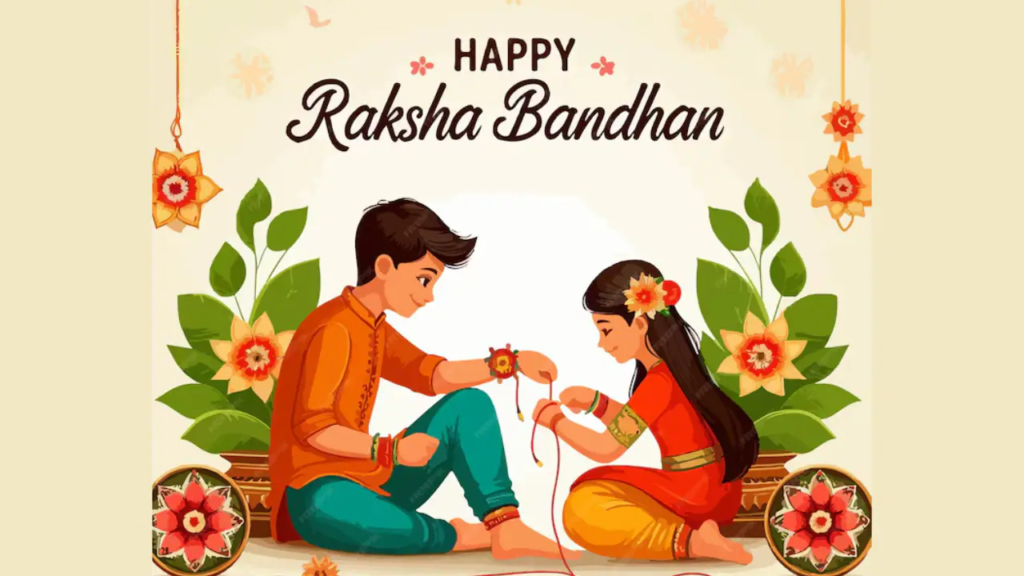
Content Table
- Introduction: Beyond Rituals, Into the Heart
- The Sacred Thread: Symbolism of Rakhi
- A Bond Forged in Time: Raksha Bandhan Through the Ages
- Love, Memory, and Distance: Celebrating in Modern Times
- More Than Blood: When Friendship Becomes Family
- Emotional Echoes: What Raksha Bandhan Teaches Us About Protection
- The Silent Promises: Unspoken Vows Between Siblings
- Rituals that Heal: The Psychological Importance of Celebrations
- From Homes to Borders: The Festival in Unexpected Places
- Conclusion: Why We Need Raksha Bandhan Now, More Than Ever
1. Introduction: Beyond Rituals, Into the Heart
Raksha Bandhan is often seen as a festive ritual wrapped in tradition. But beneath the ritualistic rakhi lies something far more profound—a tapestry of emotions, silent promises, shared laughter, and even quiet sacrifices. This blog peels away the outer layers of the celebration to reveal the emotional fabric that binds siblings, no matter the distance or difference.
2. The Sacred Thread: Symbolism of Rakhi
The rakhi may be a simple thread, but its symbolism runs deep. It is not just a string—it’s an emotional signature. Woven into it are childhood stories, protective gestures, unspoken support, and a deep understanding that transcends the spoken word.
3. A Bond Forged in Time: Raksha Bandhan Through the Ages
From ancient epics like Mahabharata to modern-day family WhatsApp groups, Raksha Bandhan has adapted with time but never lost its soul. It began with kings and queens, myth and memory, and continues today in apartment balconies and online video calls—each version equally powerful.
4. Love, Memory, and Distance: Celebrating in Modern Times
In an age of long distances and busier lives, siblings often can’t meet in person. Yet, the emotional connection grows stronger. Digital rakhis, couriered sweets, and late-night voice notes have replaced traditional thalis—but the feeling remains unchanged. Raksha Bandhan evolves, but its emotional gravity never weakens.
5. More Than Blood: When Friendship Becomes Family
Not all siblings are born—some are chosen. Raksha Bandhan today is celebrated between cousins, friends, mentors, and even neighbors. The ritual now honors the emotional choice to protect and care—beyond biological ties. It’s a festival that has opened its arms to all definitions of “family.”
6. Emotional Echoes: What Raksha Bandhan Teaches Us About Protection
“Raksha” means protection, but the festival teaches us that protection is emotional too. It’s in listening without judgment, supporting during failure, celebrating silent victories, and just being there. These quiet acts of emotional safeguarding are the true soul of the celebration.
7. The Silent Promises: Unspoken Vows Between Siblings
There are words never said but deeply felt between siblings. Raksha Bandhan becomes the moment these silent vows are honored. It is a reaffirmation that no matter how far life pulls them, their emotional compass always points home—to each other.
8. Rituals that Heal: The Psychological Importance of Celebrations
Psychologists say rituals help us process feelings, reduce anxiety, and build emotional security. Raksha Bandhan, in this sense, becomes a healing ritual. Amid fast-paced lives, it offers a moment to pause, reflect, reconnect, and emotionally recharge through love and nostalgia.
9. From Homes to Borders: The Festival in Unexpected Places
Be it soldiers receiving rakhis from strangers or children tying them to trees to promise environmental protection, Raksha Bandhan’s emotional spirit has expanded beyond siblings. It’s become a symbol of unity, peace, and mutual responsibility—even in places where ties aren’t familial but emotional.
10. Conclusion: Why We Need Raksha Bandhan Now, More Than Ever
In an era of rising stress and digital disconnection, Raksha Bandhan offers something timeless—emotional grounding. It reminds us of bonds that cannot be broken by distance, silence, or even time. It’s not just about the thread—it’s about the love that ties us all together.

